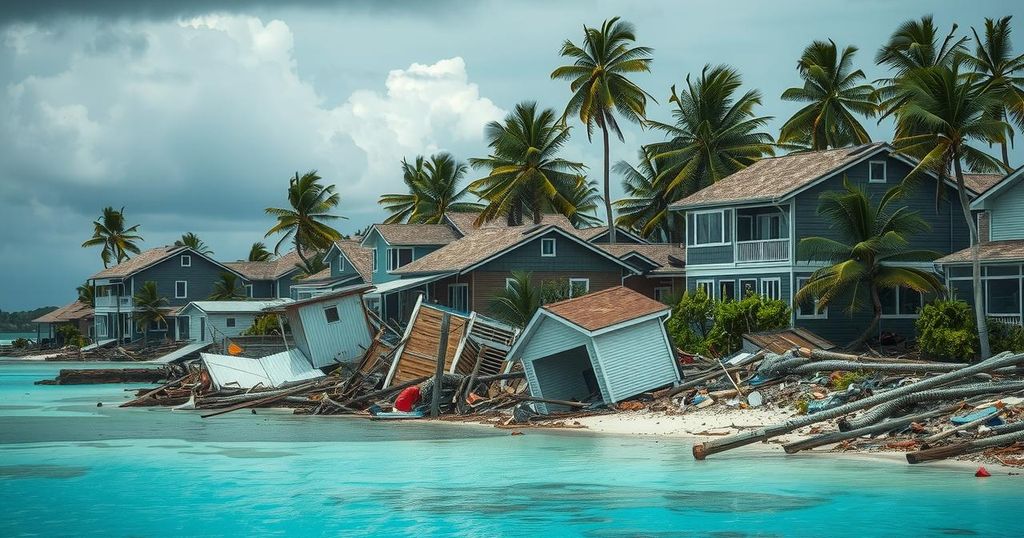Cyclone Chido: Mayotte Faces Catastrophic Devastation Amid Climate Concerns

Cyclone Chido, a Category 4 storm, recently devastated Mayotte, leading to at least 35 fatalities and significant infrastructural damage. The cyclone’s ferocity has raised concerns about climate change impacts, as the EU and other countries provide emergency aid. Future resilience will depend on transitioning to renewable energy sources to combat the increasing frequency of such extreme weather events.
Cyclone Chido, classified as a Category 4 storm, struck the French archipelago of Mayotte in December, resulting in unprecedented destruction not witnessed in nearly a century. This cyclone, with sustained winds reaching 136 miles per hour, devastated the region, claiming at least 35 lives, with fears of further casualties as rescue efforts face significant challenges. The storm obliterated vital infrastructure, including schools and hospitals, leaving two-thirds of the island inaccessible and sparking calls for urgent humanitarian aid.
Estelle Youssouffa, a member of parliament from Mayotte, emphasized the gravity of the situation, stating, “We must not confuse the villages that are cut off from communication … and the shanty towns, where there is very little chance of there being survivors. Everything has been razed.” The aftermath of Chido represents a significant concern not only for Mayotte but also mirrors the vulnerabilities faced by other susceptible regions affected by climate change.
This catastrophic event occurs amidst an alarming trend of increasing extreme weather phenomena linked to climate change, particularly in vulnerable areas such as Mayotte. The archipelago’s susceptibility is highlighted in the 2022-2026 strategic plan from the French Development Agency, emphasizing the region’s exposure to the impacts of global warming and ongoing environmental degradation. The Climate Council has noted that the conditions that foster tropical cyclone activity have intensified due to rising global temperatures, exacerbating the effects of such storms.
In response to the devastation caused by Cyclone Chido, the European Commission is mobilizing emergency assistance for affected communities in Mayotte and Mozambique. Several European nations, including Belgium, Germany, Italy, and Sweden, have pledged support by providing shelter and essential resources to those in need. The European Union’s Copernicus Emergency Management Service has initiated mapping efforts to facilitate targeted relief operations. Meanwhile, Mozambique is set to receive nearly $1 million in humanitarian aid focusing on essential services such as water, shelter, and healthcare.
The frequency and intensity of such extreme weather events emphasize the urgent need for a transition away from fossil fuels towards renewable energy sources. As the world confronts the escalating impacts of climate change, advancements in sustainable technologies, such as solar and wind energy, represent vital steps toward addressing these global challenges and ensuring a more resilient future.
Cyclone Chido emerged as one of the most devastating cyclones to hit the French territory of Mayotte in nearly a century, indicating the growing risks posed by natural disasters exacerbated by climate change. Mayotte’s geographical position between Madagascar and Mozambique makes it particularly vulnerable to severe weather phenomena, while recent scientific assessments highlight the island’s increasing exposure to extreme climatic events. This growing trend mirrors challenges faced by many regions worldwide, necessitating a concerted global response to provide humanitarian aid and address the root causes of climate change.
In summary, Cyclone Chido’s impact on Mayotte has illuminated the persistent threats posed by extreme natural disasters, especially in the context of climate change. The ongoing support from the European Union and humanitarian organizations underscores a collective effort to address the immediate needs of the affected populations. Moving forward, a strong emphasis on renewable energy development and environmental sustainability is critical to mitigate the adverse effects of future storms and safeguard vulnerable communities.
Original Source: www.thecooldown.com








